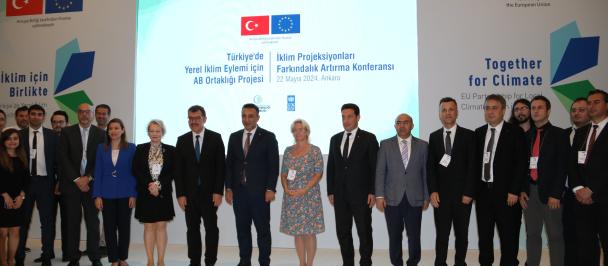UNDP project helps Türkiye manage threat of persistent organic pollutants
July 24, 2024

Hundreds of officials trained in EU-standard management of contaminated sites
Ankara, 24 July 2024 – Persistent organic pollutants (POPs) such as the infamous pesticide DDT pose long-lasting threats to human health and the environment. But Türkiye is now better prepared to meet this threat thanks to a five-year project implemented by the United Nations Development Programme (UNDP) with the Ministry of Environment, Urbanization and Climate Change (MoEUCC). The EUR2 million project, which concluded today, was funded by the European Union (EU) IPA II program and the Turkish Government.
POPs are toxic chemicals that persist in the environment, accumulating in living organisms and travelling across borders via air, water or migratory species, far from their sources. They are found in pesticides that have been used for decades, and they are released as unintentional by-products of industrial processes. They can be found everywhere: in plastics, textiles, rubber waste, non-stick cookware and firefighting foams.
“POPs are a particularly onerous threat owing to their longevity and mobility,” said UNDP Resident Representative Louisa Vinton. “By helping to strengthen Türkiye’s institutional and technical capacity to manage contaminated sites, we are paving the way to a cleaner and healthier future for all of us.”
“Most POPs are toxic and cause cancer and reproductive problems,” said the General Directorate of Environmental Management at the MoEUCC in a statement. “Serious measures are needed to fight these persistent pollutants, and this initiative has trained our personnel and built a sustainable system to achieve this.”
The project was designed to ensure that Türkiye has the expertise and skills it needs to deal with POPs-contaminated soil in line with the EU’s 2019 “POPs Regulation and Soil Contamination Strategy.” In all, 698 people in 81 provinces participated in 17 training sessions, ten workshops and four consultation meetings. 86 percent of participants said that the training would directly benefit their professional lives. A number of those who took part described how the training had taught them how better to apply EU regulations, strengthened their performance in POPs audits and improved their problem-solving capacity.
“Although most of POPs have been phased out in the EU, traces can still be found in humans and animals all over the planet and may adversely affect their health,” said Christian Ballaro from the EU Delegation. “The EU Regulation on POPs aims to minimize or eliminate where possible releases of such substances and regulate waste containing or contaminated by them. By supporting adherence to the Regulation in Türkiye, this project has made a serious contribution to protecting human health and the environment.”
Highlighting the impact of the projects implemented with EU IPA I, II and III funds in Türkiye, General Directorate of EU and Foreign Relations at the MoEUCC said in a statement that the Ministry’s Department of EU Investment has built a bridge between Türkiye and the EU with a significant environmental investment of a total of EUR1 billion for the IPA I and II periods.
In addition to the training, UNDP developed an online generic health risk assessment software, enabling both central and local staff of the MoEUCC to assess site sampling results provided by companies. This software introduces a peer-review approach that enhances data accuracy and reliability.
The project also organized study visits to Czech Republic, the Netherlands and Italy, site visits, and technical research. In addition, UNDP experts and the MoEUCC’s Directorate for Environmental Management have updated the “Regulation on Control of Soil Pollution and Sites Contaminated by Point Sources” and its annexes and technical supporting documents, such as technical guidelines on risk assessment and remediation technologies. All the revisions in the Regulation were integrated in the Contaminated Sites Information System, which will enable the MoEUCC to collect the data in a standardized way and to have a sustainable data pool for the future.
Moreover, the project has conducted research to enhance both the capacity for remediation and for comprehensive integrated chemicals management, aiming to improve overall chemicals management and prevent future site contamination. These achievements align with the project’s overarching objective of maximizing multiplier effects and ensuring sustainability.
A coloring book was also prepared to raise awareness of children about keeping our soil clean (to see a copy, please visit: https://kalicikirleticiler.com/en/news/painting-book/).
For more information:
Bahar Paykoç, UNDP Türkiye, bahar.paykoc@undp.org

 Locations
Locations



